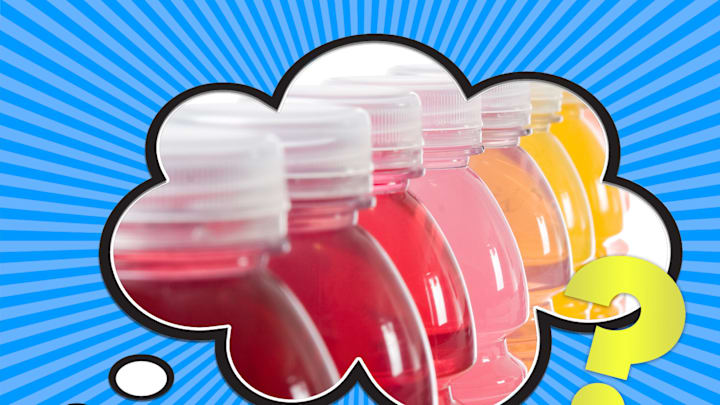Following exercise, some people reach for sports drinks like Gatorade or Powerade instead of plain water. The drinks boast of being packed with electrolytes, which are believed to need replenishing after strenuous activity. (Or, if we can be indelicate, following a bout of diarrhea.)
But what exactly are electrolytes, and do our bodies really need to be topped off with them?
According to the Cleveland Clinic, electrolytes are a catch-all term for substances that assist your body in a number of processes, including chemical reactions and fluid balance. They’re so named for their positive or negative electrical charge when they’re dissolved in water. Those charges contract muscles and control hydration levels.
Sodium, magnesium, potassium, calcium, chloride, phosphate, and bicarbonate are all considered electrolytes. Too much (hyper-) or too little (hypo-) of each can prompt a reaction from your body, including weakness, muscle contractions, fatigue, or confusion.
Electrolytes are typically fortified through a healthy diet. Any number of medical conditions or problems can affect electrolyte levels, which can be measured via blood tests by a health care provider. Usually, electrolytes are thrown off balance by exertion and the resulting loss of fluids via sweating. Alcohol consumption can also prompt dehydration.
So if you’ve lost electrolytes, should you try replacing them? According to the Harvard School of Public Health, electrolyte depletion typically occurs after an hour or more of strenuous exercise. You’re not likely to suffer any ill effects after a moderate jog on a treadmill or weight training. It’s only when sweating considerably for a prolonged period of time that you should consider rapid replenishment with a sports drink, particularly if the drink contains a lot of sugar.
Plain water is usually best for any kind of stomach-related illness, as well. The sugar in sports drinks can potentially worsen stomach symptoms. In those cases, an electrolyte drink like Pedialyte may be a better choice, and then only if symptoms are prompting prolonged fluid loss.
The bottom line? Unless you’re engaged in a serious, intense athletic endeavor or have a medical condition, you probably don’t need to worry about electrolytes.
Have you got a Big Question you'd like us to answer? If so, let us know by emailing us at bigquestions@mentalfloss.com.
